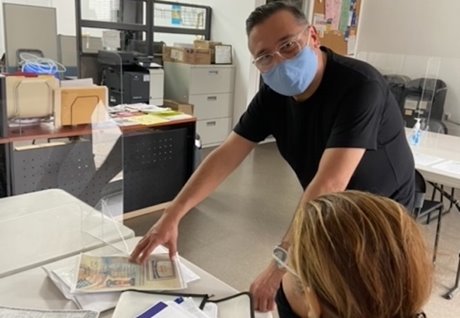An outreach team at Neighborhood Housing Services of Baltimore is working on "doorknockers" and postcards to let the community know they're ready to provide foreclosure assistance and prevention. NeighborWorks America's Keeping People Housed initiative, made possible through a collaboration with Wells Fargo, helps fund the project. The initiative includes $665,000 in grants to network organizations with experience serving communities of color.
"In 2008, when we had the housing crisis, Neighborhood Housing Services of Baltimore changed gears from providing prepurchase counseling to foreclosure counseling," recalls Cassandra Robb, director of Homeownership Preservation. As that crisis lessened, they went back to prepurchase counseling. But in October of 2021, as they prepared for the end of pandemic-era evictions and foreclosure moratoria, they used the grant to hire a foreclosure manager and readied their staff for clients whose financial troubles were made greater due to the virus.
Chesca Stein, the new foreclosure manager, has spent her last few months connecting homeowners to assistance. She's worked with homeowners who inherited homes and are dealing with tax bills they can't pay. But many of her calls, she says, are from people who have been affected by COVID-19 – people who lost their jobs or got sick and got behind. Catching up is hard. Residents owe an average of $8,000, but others owe up to triple that amount, she says.
During the last financial crisis, Stein remembers seeing cards on busses, urging residents to seek modifications: Mortgage late? Don't wait! "We're not seeing that this time," she says. "So it's up to agencies like ours to get the word out."
Robb says the agency is using social media in addition to the postcards and doorknockers. The hope, she says, is to convince those who have been reluctant to reach out to make that reach.
 At New York's Asian Americans for Equality (AAFE), staff support residents through counseling and by helping them tap into programs providing rental assistance for those whose financial situations became more precarious during the pandemic. "The programs helped renters pay what they owed," explains Emily Rios, AAFE's managing director of Community Services. "That prevented eviction." One of those programs, the Excluded Workers Fund, assists residents regardless of immigration status.
At New York's Asian Americans for Equality (AAFE), staff support residents through counseling and by helping them tap into programs providing rental assistance for those whose financial situations became more precarious during the pandemic. "The programs helped renters pay what they owed," explains Emily Rios, AAFE's managing director of Community Services. "That prevented eviction." One of those programs, the Excluded Workers Fund, assists residents regardless of immigration status.
AAFE also offers Know Your Rights workshops, explaining rights to renters surrounding succession, heat, hot water and eviction. AAFE offers the workshops in Nepali, Bengali, Chinese and Spanish languages to meet community needs. Meanwhile, the organization works with the Asian American Bar Association, collaborating on pro-bono legal clinics. This year so far, they've served 150 people through the program. About 80 % of the consults pertain to housing.
"The grant has been extremely helpful," Rios says. "It has injected funding that enables us to sustain and create more successful programs, like the legal clinics." The grant has covered stipends for translators, the cost of know-your-rights fliers and more. "The grant has helped us fill the gaps that really enable us to do this work and be creative," Rios says.
Rosie Figueroa, director of Counseling and Sales at St. Joseph's Carpenter Society in New Jersey, says the grant offered her network organization the chance "to get ready for what we see coming," as they continue to connect residents to assistance programs and work on mediation with landlords. "Now that the moratoria have expired, the courts are opening up," she says. "We have several cases where we have mediated between landlords and tenants, where people have fallen behind but are now back to where they need to be."
Figueroa says COVID hardships hit individuals in a range of ways. In one case two area teens suffered from COVID-induced depression. Their mother left work to manage their care. "Her debts never stopped," Figueroa shares. "It was good that she looked for assistance. Sometimes, you don't see the light." St. Joseph's helped her form a plan to catch up – and stay housed.
02/28/2022

